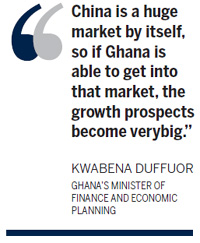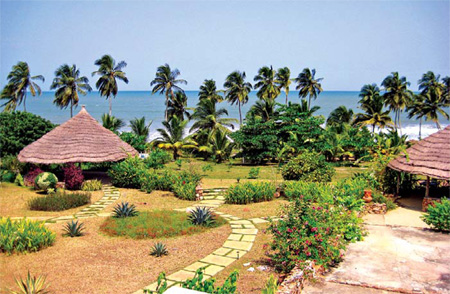News
Ghana's assets invite sweet investment
(China Daily)
Updated: 2010-10-26 07:57
 |
Large Medium Small |
|
Ghana is an inviting place for business and leisure travelers. Provided to China Daily |

New hopes for cocoa as improved conditions for farmers keep the crop
As the world's second-largest producer of cocoa, Ghana is determined to keep this important commodity and the sector in optimum condition.
A major source of export and fiscal earnings, cocoa production averages around 700,000 tons a year, a target the government wishes to see rise to 1 million tons in the coming years.
While around 20 percent of the crop is processed into liquor, paste and butter, the rest is exported in its raw state, to Europe, Japan, China and other Asian countries, and the US.
Charged with promoting the production, processing, and marketing of cocoa at home and abroad, Ghana Cocoa Board (Cocobod) works to ensure a quality product and provide support for farmers who risk exploitation on world markets.
The entity currently contributes around 8 percent of the gross domestic product - a figure that could now rise significantly, thanks to recent moves taken by government and Cocobod to curtail endemic cocoa smuggling to neighboring countries willing to pay higher prices.
Effective from Oct 1, Ghana's new tonnage price rose a staggering 33.3 percent, a strategy Cocobod's chief executive, Tony Fofie, believes will go a long way to keeping the cocoa in the country.
"If the smuggling activities are stemmed and the organization is fully resourced by the government, Cocobod would be able to meet its 1-million-ton production target," Fofie said.
Announcing the new prices, Ghana Minister for Finance and Economic Planning Kwabena Duffuor also unveiled plans to pay the farmers bonuses this December, while Fofie revealed that financial experts have been hired to organize pension plans.
Cocobod began investigating the BRIC (Brazil, Russia, India and China) markets some five years. Although they import around 2 percent of production, Fofie would like to see this rise, in China particularly, as he oversees a review of the production and post-harvest technology.
"China could be the home of the processing of Ghana cocoa," he announced. "When they process it, they do it in such a way that it makes China start drinking cocoa or eating chocolate, as an alternative to coffee.
"China could also come and assist us with investment; in plantation development, for example, through private public partnerships. Cocobod is just the regulator, but we have thousands of private, small-scale farmers. China could assist with processing facilities here or in China.
Either way would be a win-win situation, where China can create jobs for its people and we could create jobs for ours."
The Cocobod chief, who is himself a horticulturalist, is keen to run with the government's plans to make Ghana and Africa the "World Food Basket" of the future, as was proposed at the African Green Revolution Forum in Accra in September.
"We can achieve what India achieved during their Green Revolution if we contribute a good percentage of our budget to the development of agriculture," he said.
Fofie is adamant that it is the quality that sets Ghana's cocoa apart from its competitors. "Our cocoa is a benchmark, a reference point for determining quality," he says. "Ghana cocoa produces the best chocolate. Quality international producers are happy with our beans. Chinese producers should come and explore our product."
A healthy partnership
Ghana's Finance Minister, Kwabena Duffuor, spoke to InFocus Reports about Ghana's "healthy" partnership with China.
"China is a huge market by itself, so if Ghana is able to get into that market, the growth prospects become very big," he said. "We are very focused on that and are obviously extremely excited about our dealings with China because of its size and potential.
"Today, technology is a high priority and we will get a transfer of that technology from China. Our economy is not even close to China's, but we do have resources and we are growing all the time. We have gold, minerals like bauxite and manganese and now we have oil.
"We are now going to forge the partnership we have with China to grow our economy even faster. We need to create jobs as we have a young population. Our inflation has been dropping consistently for over a year. Our currency has also stabilized and is very strong. The rate of borrowing has gone down. So it is very clear, on our part, that government is doing well.
"I met with a Chinese delegation in September and told them that they need to look at the technological pace of our economy. It is only when you have a strong technological pace that you can grow infrastructure, manufacturing and industry.
"Because of the oil, the future is bright, but we don't want to forget our non-oil sectors. Agriculture will be maintained and controlled. Cocoa has been the lifeblood of this country for centuries. A lot of Ghanaians are dependent on it.
"Everything we have in this country is the best; the oil is sweet crude, the cocoa produces the best chocolate. We have great assets, and our people are intelligent and love people. When you have all of this, all you need to do is manage your resources and you have a great nation."
As the chairman of Ghana's Divestiture Implementation Committee, minister Duffuor is keen to push ahead with privatization initiatives.
"Many of our enterprises have been State-owned for years and some of them we cannot manage well. We understand that, and it makes a big difference.
"The Bui Dam is an example of a huge transfer of technology from China to Ghana. They put in so much capital, and when it is complete, it will reduce the cost of doing business as energy costs go down. We need China's help with large infrastructural projects, like railways, and super highways."
A catchword of Africa
Speaking to InFocus Reports last month, Deputy Minister of Trade and Industry Mahama Ayariga said: "Ghana is actually a catchword for Africa now. In Ghana you can see people working very hard to get their act together.
"That is what everybody is looking out for so that they can work with them. China is also getting their act together. People are generally looking for places to invest and do business and generate wealth to share with the rest of the world and if you create a stable place, you put the infrastructure in place and you develop competent hands to help them and they can see the political stability, then they will come and partner with you. I think that is why they are coming to Ghana - they see us making a genuine effort to create wealth and share it with the rest of the world."
And, as the CEO of Ghana Investment Promotion Center (GIPC) points out, the World Bank's initiative to partner Chinese companies to invest in Africa reinforces the country's present influence in the world economy.
George Aboagye of GIPC said: "If I were in China and I were to see a small country in West Africa projecting itself as 'A Country', I would see them as a growth area.
"Having the resources China needs and the potential for growth and cooperation is a win-win situation for all. Nevertheless, in any growth paradigm, there needs to be one specific starting point; and that place is the Gateway to Africa. That is Ghana."

(China Daily 10/26/2010 page7)
